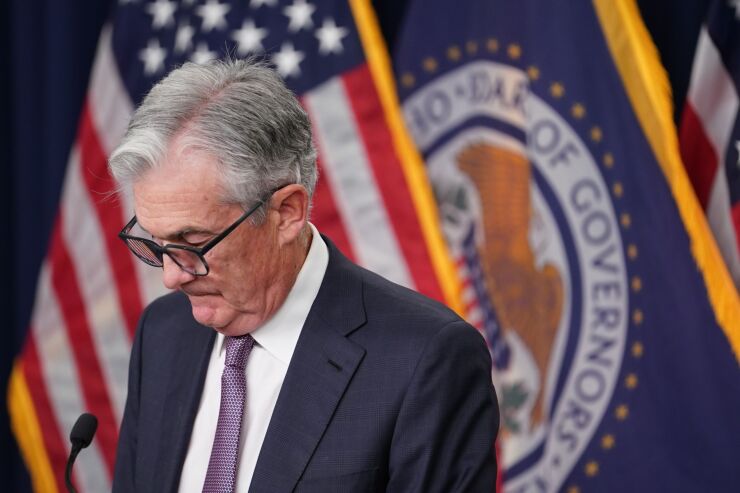The Federal Reserve will likely have to sell assets to bring its balance sheet down to a more appropriate size, Chair Jerome Powell said, but will not be taking that step anytime soon.
"It's something I think we will turn to, but that time — the time for turning to it has not come," Powell said during a press conference after Wednesday's Federal Open Market Committee meeting. "It's not close."
The Fed has slowly been

This month, following a schedule set in June, the Fed doubled that effort for a total monthly maximum runoff of $95 billion.
Home sales have tapered off in recent months as rising mortgage rates have dampened demand. Mortgage applications for new homes
This slowdown in origination has not caused the Fed to rethink its strategy for letting its holdings of mortgage-backed securities expire or selling them into the open market, Powell said.
"What we said, as you know, was that we would consider that once balance sheet runoff is well underway," Powell said of selling mortgage-backeds. "I would say it's not something we're considering right now and not something I expect to be considering in the near term."
How the Fed manages its balance sheet reduction has a direct impact on the banks. Shedding assets also reduces liabilities, such as reserves, which are
The Fed's exit from the mortgage securities market, regardless of its speed or scope, also has an impact on the cost of home financing. It is already reducing demand for securitized mortgage debt by limiting its buying activity. A shift to selling could devalue MBS further. A weaker secondary market for mortgages could contribute to even higher mortgage rates.
Powell said housing prices were increasing at an unsustainable level before the Fed began combating inflation in March. The deceleration in recent months is the result of supply and demand being brought into better balance, he said, but a full correction might be necessary to bring housing costs in line with rents and other fundamentals.

"Shelter inflation is going to remain high for some time," he said. "We're looking for it to come down but it's not exactly clear when that will happen. It may take some time, so I think, you know, hope for the best, plan for the worst."
The FOMC voted this week to raise its benchmark interest rate by three-quarters of a percentage point to a target of 3% to 3.25%. The hike puts the Fed's interest rate above 3% for the first time since 2008.
The Fed has raised its interest rate by 75 basis points in three consecutive FOMC meetings and 3 percentage points overall since March.
This week's move also officially puts monetary policy into a restrictive position, meaning it exceeds the project longer run rate of 2.5%. But Powell said that does not mean the Fed plans to ease up on rate hikes anytime soon.
"There is a possibility, certainly, that it would go to a certain level that we're confident in and stay there for a time, but we're not at that level, clearly," he said. "We just moved into the very lowest level of what might be considered restrictive, and certainly in my view and the view of the committee, there's a way to go."




